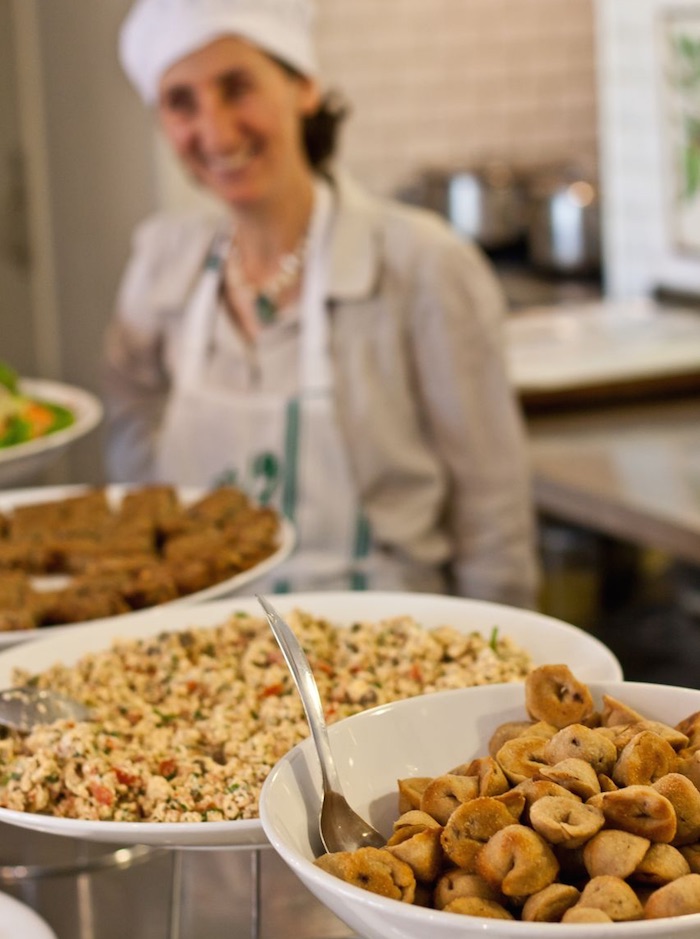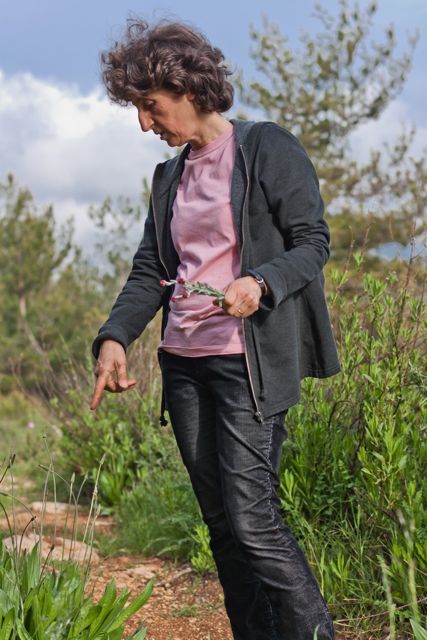From the Chouf with love
Mountain food

The village of Kfarkatra lies beautifully on a green slope in the Chouf mountains, one hour’s drive from Beirut. Although tiny in terms of inhabitants, Kfarkatra has a big culinary significance: this is where people made the very first debes ruman, the pomegranate molasses which is a staple in Lebanese kitchens and essential to dishes like fattoush, mohammara, and stuffed vegetables. Today, with debes ruman being mass-produced, it is small-scale farmers and producers that are the heirs of this food tradition. Kfarkatra couple Walid and Maysoon Nasreddine are two of these.
“This is where they used to make debes ruman,” says Walid, pointing to two large hollowed stones in the ground. Hidden among trees and bushes, long since covered with moss, we find them after having ventured for one hour into the mountainous terrain. Before reaching this point, both him and Maysoon have stopped constantly along the way to point out edible plants or to pick sage and zaatar (a sort of wild thyme which is central to Lebanese cuisine) to be brought back to the kitchen. Some of the herbs will be used for dinner later in the evening, but most are for Coara, Walid and Maysoon’s brand of organic and vegetarian food products.
“We are children of the countryside.”
A small-scale company, Coara is run with a great deal of devotion. The couple’s commitment to natural food dates back to when they were kids, born and raised in different villages in the Chouf. “We are children of the countryside,” says Walid. “Using and caring for what nature gives is something that we have always done.” Later, they became vegetarian when news about the mad cow disease spread from the UK across the world in the mid-90s. “That made us think about our way of eating,” says Maysoon. “We stopped eating meat, and realised that this was the best thing we could do to our bodies.”
At that time, they both worked in engineering. But, in 2002, they decided to change profession just the way they had changed their eating habits. “We wanted to work with something that we love,” says Walid, “The first we did was to start producing mouneh.” Mouneh is a traditional means of preserving food and getting prepared for winter, which has been used in Lebanon for centuries (it has proved essential in times of war as well). Through pickling, drying or covering with oil, seasonal produce like aubergines, cucumbers, carrots, olives or labneh can be stored for consumption during the colder months.
“We loved working with mouneh,” continues Walid, “but there were already several mouneh producers in Lebanon, whereas no one was doing vegetarian food.” Therefore, the couple decided to transform their mouneh company into a vegetarian meals and food service, through which they could realise their vision of bringing the countryside to the city. “Through Coara, we can take nature closer to people,” says Walid. “It is people in the city who need this kind of food the most. Us who live in the countryside, we are close to nature already.”
“It is people in the city who need this kind of food the most. Us who live in the countryside, we are close to nature already.”
Coara is now an integral part of the Nasreddine’s: the facilities — or atelier, as Walid says with a smile — share the same grey stone house as the couple and their sons. A wooden door on the second floor leads us through to a big and rustic space that used to be the home of Walid’s brother before becoming a culinary workspace. It is here that Maysoon and Walid sprout beans, bake whole-wheat versions of Lebanon’s signature pastries, make their own seitan and tofu, mix variations of gomasio and zaatar, and pack sun-dried tomatoes which have been dried on the roof of a neighbour’s house. In the far end kitchen, still decorated with the flower-patterned tiles that Walid’s brother put up 30 years ago, they prepare traditional Lebanese food with an innovative edge: seaweed pastries, kebbeh made with carrots and nuts, salads with quinoa and stews with the wild and spiny akoub. As many of the ingredients as possible are organic; vegetables come from local farmers while soybeans and seaweed are imported from abroad.
Cooking in a way that shows consideration for the environment is the raison d’être for Coara. Walid continues to describe other, deeper, philosophical aspects of their work. “As Druze, we believe that things have a meaning not only here and now, but also in previous and future lives.” This belief in reincarnation is one pillar of the Druze faith, a religious teaching with most of its adherents living in Lebanon, Syria and Israel. Another holistic element is the belief in human accomplishment and improvement. “My task as a human being is to be as good a person as I can,” says Walid. “I have a responsibility for my own actions, what I make out of myself in this world. All these things are reflected in our work with Coara.”
“As Druze, we believe that things have a meaning not only here and now, but also in previous and future lives.”
Although vegetarian and organic food was unheard of for many when the couple started, the concept of green produce is slowly gaining momentum. Beirut hosts two farmer’s markets today: Hamra’s Souk el Ard on Tuesdays and Souk el Tayeb in Beirut Souks on Saturdays — where Walid and Maysoon have come every week since the start in 2004 — and it is becoming easier to find organic vegetables in the supermarkets. However, while these initiatives are excellent for increasing green food options in Beirut, they reach only a limited part of the city’s population. Souk el-Tayeb, as beautiful as the market is, has a location right in the middle of the shiny downtown area where consumerism reigns and stores have price tags that exceed the monthly salaries of many Lebanese. Like elsewhere in the world, since both economic ability to buy organic food and the awareness of its benefits depend on education and social status, healthy eating habits have become a contemporary class issue.
For Walid and Maysoon, this is something that could be overcome through lifestyle choices. “If people would live this way,” Walid points towards the mountains outside the window, “then every family could grow their own food.” He continues: “Coara has turned into a great thing for us. Now, we get to work with something we love. But, this has not made us rich. See that door, closing off the living room where we have the fireplace? It was only installed last autumn, after 17 years in this house. And winters here get cold. But, in the end, we’re happy. Being able to live this way means more than money.”

7 thoughts on “From the Chouf with love”
Leave a Reply
You must be logged in to post a comment.









such a beautiful way to preserve the Lebanese food tradition. nowadays we are getting too far from REAL food. preservatives, fastfood, chains who serve dishes that taste the same all across the world. and Lebanese are getting fatter and more unhealthy too. kids get fed with crisps and cookies, not the green and hearty dishes that are our heritage. we must change!
Great sorry. So well written and with a nice feeling to it. mabrouk well done Jenny and Mashallah!
Jenny habibti, I’m so proud of you…your love to lebanon warms my heart! keep walking dear with your beautiful smile. Namaste.
Jenny! Vilken bra artikel, skrivet med känsla och värme! Du är bäst:) Kram mum
Amazing! I am blessed! Bless you back with prayers and thanks!
waw i am so happy to read about all that. i am tourism expert and i am mainly focusing on creating conscious tourism. for the time being i am creating tours for the shouf area and would love to meet you. waiting for your reply, meantime send you all my appreciation and love for what you are doing and for what you are. Aoun